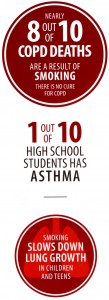 Respiratory Diseases
Respiratory Diseases
The chemicals in cigarette smoke cause immediate damage to cells and tissue in the human body, including those on the path from the mouth to the lung’s air sacs-the final target of the smoke. Delicate lung tissue damaged by chemicals in cigarette smoke doesn’t have a chance to heal if it is exposed to these chemicals in large amounts day after day. The result is a wide range of deadly lung conditions.
Chronic Obstructive Pulmonary Disease
Smoking causes chronic obstructive pulmonary disease (COPD). COPD includes several underlying lung diseases, such as emphysema and chronic bronchitis, in which the airways are damaged and can never completely heal, and the lungs lose their elastic properties. People with COPD suffer from shortness of breath, coughing, difficulty exercising, air trapped in their lungs, swollen airways, and scar tissue. As a result, they may even have trouble with routine activities such as walking and dressing. Their quality of life can drop significantly. Over time, COPD cause low oxygen levels in the body. People with COPD are at high risk for many other serious diseases, including lung cancer and heart disease. The disease has no cure. Women are now dying from COPD in about the same numbers as men, and women appear more susceptible to developing severe COPD at younger ages. Women smokers in certain age groups are more than 38 times as likely to develop COPD, compared with women who have never smoked.
Tuberculosis
Tuberculosis (TB) is a common infection worldwide that usually attacks the lungs. TB is spread through the air when people with the disease cough or sneeze. It was once a leading cause of death in the United States, but advances in public health have made TB far less common here. However, it remains a serious health issue elsewhere in the world. According too the World Health Organization, TB caused 1.4 million deaths worldwide in 2011. There is now enough evidence to conclude that smoking increases a person’s risk of getting TB disease and dying from it.
Other Respiratory Damage Caused by Smoking
More than 11% of high school students in the United States have asthma, and studies suggest that youth who smoke are more likely to develop asthma. Breathing someone else’s smoke also triggers asthma attacks in nonsmokers. Children exposed to secondhand smoke have more respiratory infections than children who are not exposed. Although the body has ways to prevent or lessen the severity of injury caused by agents inhaled into the lungs, these defenses are overwhelmed when the body is exposed to cigarette smoke over and over again. People who stop smoking begin to breath higher levels of oxygen in the body, and lower their risk of respiratory disease compared to those who continue to smoke.
Check Also
Recurrent UTIs: Addressing the Risk of Antibiotic Resistance
Urinary tract infections (UTIs) are common bacterial infections that affect millions of individuals worldwide each …
 Central Florida Health and Wellness Magazine Health and Wellness Articles of the Villages
Central Florida Health and Wellness Magazine Health and Wellness Articles of the Villages



